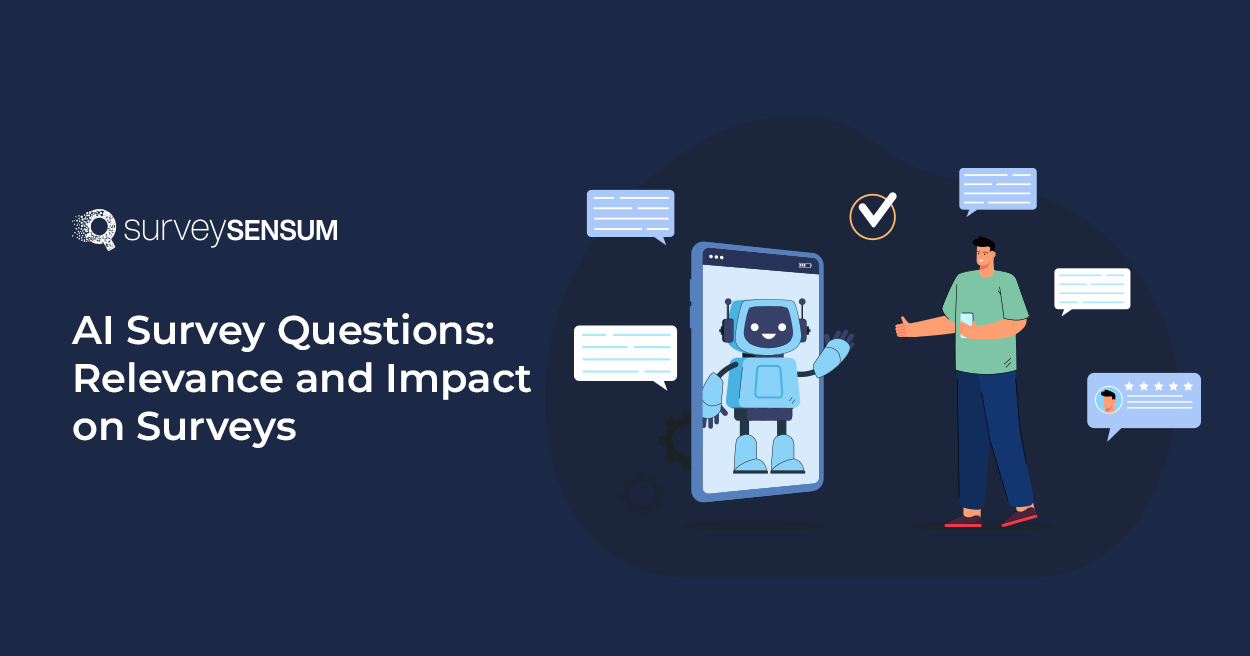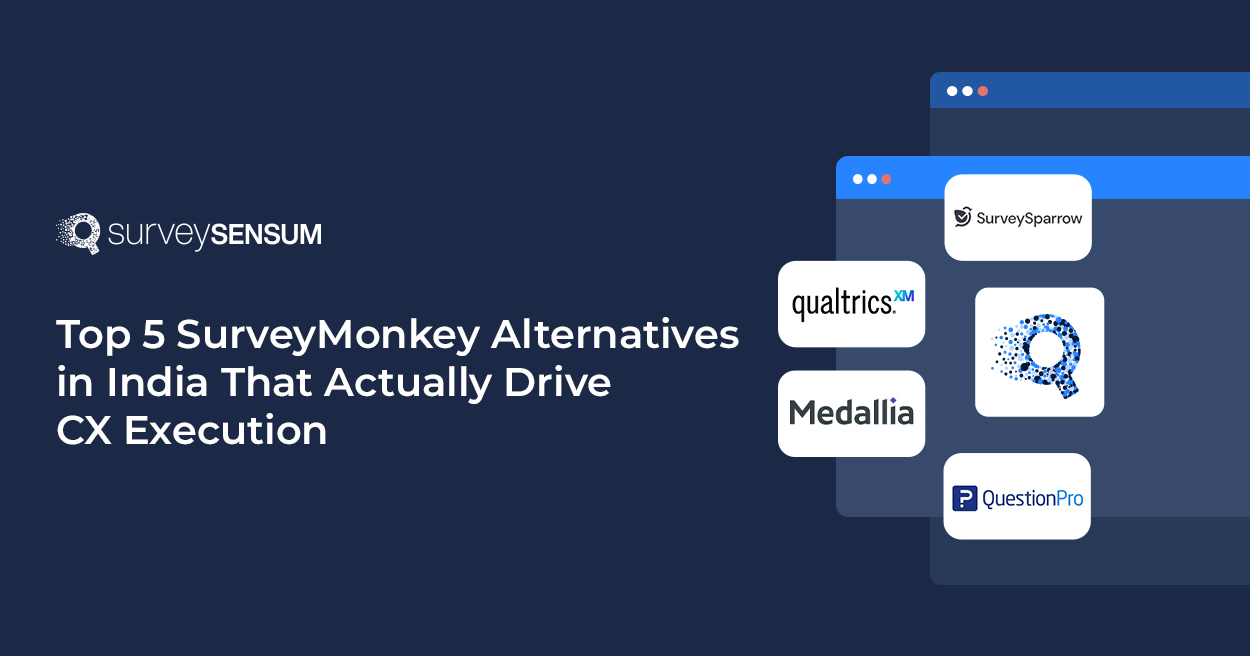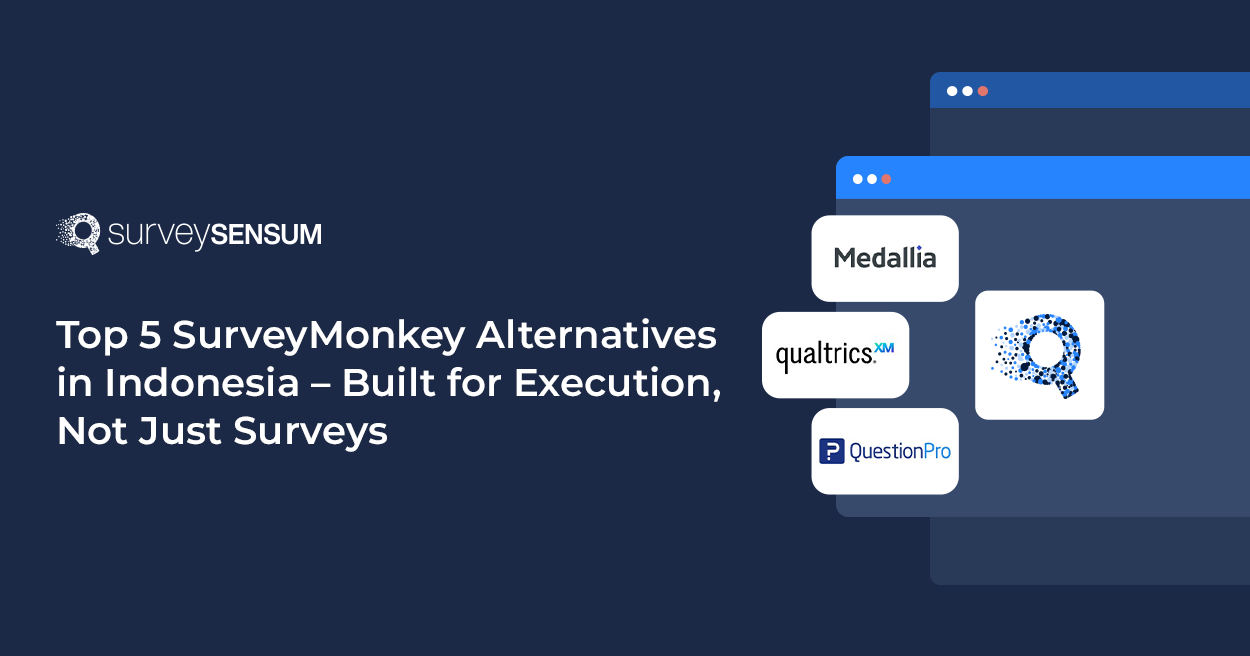

Creating survey questions is easy, but creating survey questions that YIELD high response rates with unbiased answers is an art.
Now, that’s indeed a time-consuming and complicated task. But what if we could make it both easier and more effective? This is where the power of AI survey questions comes into play.
Yes, with the help of AI, you can create questions that align with your survey goals. These questions are relevant to the respondents and facilitate a seamless survey experience for them.
Interesting? Then, let’s discuss further about AI survey questions and their importance in creating effective surveys and improving customer experience.
First Things First – The Importance of Asking the Right Questions
Let’s say you are the respondent. Here’s something to think about.
Would you take the time to fill out a 20-question-long survey?
Would you rack your brains to answer a survey questionnaire you can barely understand?
Or even spend your time patiently answering irrelevant or intrusive questions?
The answer is a resounding “NO”. Isn’t it?
Why? Because survey questions are only effective if they are asked with the intent of ACTUALLY understanding the feedback without too much effort! Those mentioned above weren’t the only issues with surveys. Here are the most common challenges/problems I’ve seen with many surveys.
- Double-barrelled questions: These are questions that ask about multiple topics while expecting a single answer. Such questions can confuse the respondents, resulting in biased answers or incomplete surveys.
- Numerous open-ended questions: Most of your respondents don’t have the time to respond to every open-ended question. Additionally, it also generates lengthy responses, going through which can prove to be a task. So, it’s best to limit open-ended to questions 2 or 3 in number.
- Leading questions: Leading questions are biased questions that prompt only a set of desirable answers. This is not going to help your business as you are likely to receive skewed responses.
- Personal and irrelevant questions: Now, this is a huge turn-off for respondents and might push them to leave the survey midway.
- Not giving enough options in multiple choice questions: Such questions can again reduce your survey response rates as respondents may fail to find answers that fit their views.
- Lengthy surveys: Complex surveys with a large number of questions can be time-consuming. This will eventually force your respondents to leave your survey incomplete
Instead, here’s what you need to do —
- Ask relevant questions in clear, simple language that your respondents can easily understand.
- Each question should align with the survey goal.
- Make sure that your questions capture your audience’s attention.
- Try to be as transparent as you can with your respondents. Share the reason behind surveying them and establish trust.
- Remove any sort of question that can confuse your respondent.
- Create questions that support conditional branching; a feature that adjusts the next question or page a respondent sees based on their current answer. This can save a lot of time.
So, yes – crafting effective survey questions requires careful attention and research. An effective survey will have good questions that serve a clear purpose leading to reliable insights, and AI can help you with it!
Leveraging Artificial Intelligence in Survey Questions [AI Survey Questions]

Now, What are AI Survey Questions?
AI survey questions are generated by smart AI algorithms and machine learning. These questions are efficient, adaptive, unbiased, and highly personalized to respondents.
The Impact of AI Survey Questions
Let’s see how impactful and beneficial AI survey questions are for researchers and businesses.
- Relevant Questions
AI-driven questions are backed by NLP and machine learning consultants, to continuously learn and adapt to create questions based on respondent’s previous answers and survey data. By doing so, AI can facilitate relevant and targeted questioning.
- Unbiased Questioning
AI can sift through a large amount of data and respondent answers in real time to create unbiased questions based on factual data.
- Smart Survey Design
AI-driven questions enable smart survey design with the help of adaptive branching survey logic. With such a provision, follow-up questions are modified automatically to pertain to the participant’s previous responses, so that they need not answer or skip questions. Thus, a seamless flow is maintained for respondents, reducing the survey length and enhancing their overall experience.
- Time-Saving Surveys
Evidently, with survey questions driven by AI, you don’t have to spend hours brainstorming and coming up with the perfect questions. All you have to do is give the right prompt to curate an efficient AI-driven questionnaire backed by data.
Challenges of AI Survey Questions
AI is undoubtedly a great tool for creating questions. However, AI survey questions aren’t perfect. They come with a few challenges.
1. Inherited Bias
The efficiency of an AI survey question depends on its training data, which is why it comes with the risk of inherited bias from the data. AI models are trained on existing datasets. If the said datasets contain biases, for instance, a lack of diversity in audience demographics, the AI questions can also reflect the bias. This will ultimately result in skewed responses and reduced response rates.
2. Contextual Blind Spots
It is a fact that AI can analyze data well. However, if the training data you feed fails to accurately convey the context of your survey (target audience, demographics, goal etc., the generated AI questions can reflect the inaccuracy, making them irrelevant and biased.
3. Lack of Human Touch
As efficient as it can be, AI questions can struggle to capture the nuances of human emotions. This can result in surveys feeling impersonal and robotic to respondents.
4. Ethical Challenges
AI-driven questions can raise concerns about privacy, consent, and transparency. Why? Due to the risk of inadvertently collecting sensitive information from various sources without proper consent. The respondents might not be fully aware of how their data is being used or analyzed. So, you will have to ensure the ethical use of AI to maintain trust.
So, yet while AI can be really lucrative in creating good survey questions, it comes with its own limitations.
Well, we have a full-fledged solution for you.
→ What if you only had to explain your survey objectives and you get the insights you need?
If you’d like something like that, then SurveySensum is the feedback tool you are looking for!
SurveySensum – The Game Changer
SurveySensum is an AI-powered feedback management platform that can help you overcome the challenges of AI survey questions. The tool can help you create professional and efficient surveys that cater to your target audience without any bias or other inefficiencies.
Let’s see how.
With Dedicated CX Expert Guidance
SurveySensum assigns a dedicated CX expert to you. They will provide their expertise to you via dedicated sessions.
Our service does not involve manually removing anything. Instead, we offer you a dedicated Customer Experience (CX) expert who will assist you through the entire process. Here’s what our CX expert will do:
Step 1: Workshop
- The workshop focuses on identifying the challenges you face and the purpose of conducting the survey. Is it to improve a touchpoint experience, boost customer satisfaction, increase NPS, identify drop-off reasons, or reasons behind customer churn?
Step 2: Survey Creation
- The CX expert collaborates with you to create a relevant and effective survey tailored to your needs.
Step 3: Insights and Actionable Recommendations
- As feedback starts coming in on the dashboard, the CX expert will provide you with key actionable insights.
- These insights are prioritized based on their potential impact.
For example if the objective was to increase the NPS score, then the insights shared will be like –
- Action X could have a 5% impact on NPS..
- Action Y could have a 7% impact on NPS.
[If the challenge is to improve customer satisfaction instead of NPS, the insights will be shared accordingly.]
Our goal is to ensure that every action you take based on survey insights has a direct and positive impact on your business metrics.
Maximize Your Survey Impact with Expert CX Guidance from SurveySensum
With Intelligent and Comprehensive Features
1. A Variety of Surveys and a Myriad of Templates

SurveySensum’s no-code platform helps you create surveys within no time. With this tool, you can craft a myriad of surveys ranging from NPS and CES to CSAT, CSI, ENPS, and more. You can either start from scratch or choose from 100+ ready-to-use templates. All of this
Now, you don’t have to train your AI model to create templates. This tool comes with all these features off the shelf and lets you personalize them with your own unique voice.
2. An Array of Question Types

Choose from an array of customizable question types. You can pick from a myriad of question types like multiple choice, text, numerical scale, grid, emojis, dropdown, and more. Why, you can even add file uploads, images, and whatnot! All this is pre-built for you through SurveySensum. You don’t have to prompt AI manually to create one.
3. Modify Survey Structure to Boost Interactiveness

If you are looking for questions that adapt and personalize to suit your respondent’s previous answers, they’ve got that covered as well with Skip Logic and Answer Piping, which helps you customize your upcoming questions based on individual responses.
Enhance Survey Experience and Boost Response Rates with Surveyzsensum’s Effective Questioning
4. Multilingual Surveys for Your Audience

Yes, you heard it right. You can curate questions in the languages that your respondents might prefer. SurveySensum offers 100+ languages to choose from via its intuitive language editor. With SurveySensum, you just have to choose from a list of languages, while you have to create a separate algorithm to train AI to do the same.
5. Share Anonymous Surveys

You also have the provision to share anonymous surveys to ensure your respondents can share feedback openly while maintaining their privacy.
Conclusion
AI survey questions can help you craft effective surveys quickly. However, the AI models will have to be provided with impeccable training to make them curate reliable and efficient questionnaires. When that’s the case it’s best to rely on AI-powered feedback tools like SurveySensum. Guided by CX experts, you can quickly curate unbiased surveys and add the much-needed human touch to the questionnaire. Surveysensum also enables you to analyze data with the help of AI, extract powerful insights, and make the right decision to make the right impact on customer experience.














